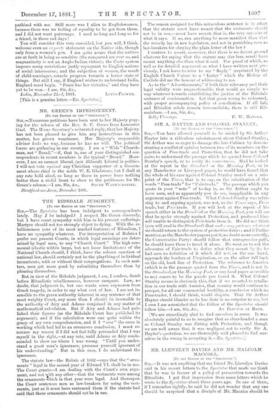SIR A. HAYTER AND COLONEL STANLEY.
ro THE. EDITOR OF THE " SPECTATOR."] S1R,—You have allowed yourself to be misled by Sir Arthur Hayter into a ridiculous misstatement about Colonel Stanley, Sir Arthur was so eager to damage the late Cabinet by demon- strating a conflict of opinion between two of its members on the question of Free-trade and Protection, that he did not take pains to understand the passage which he quoted from Colonel Stanley's speech, or to verify its correctness. Had he looked at the report in the Standard or the Morniag Post, or in any Manchester or Liverpool paper, he would have found that the whole of his case against Colonel Stanley rested on a mis- print of the Times, that is to say, on the substitution of the words " Free-trade" for "Pair-trade." The passage which you quote in your " note " of to-day is, as Sir Arthur ought to have seen, and as apparently you do see, inapplicable in any argument against Free-trade. What Colonel Stauley was refer- ring to and arguing against, was not, as the Times says, Free- trade, but Fair-trade. If you will look at the report of his speech either in the Standard or the Mor» lay Post, you will see that he spoke strongly against Protection, and professed him- self unable to distinguish Fair-trade from it. He did not think (you will read in the Standard) that undvr any pretence whatever we should return to the system of protective duties ; and if Parlia- ment (or, as the Manchester papers put it, no doubt more correctly, the Conservative Party) should follow that retrogressive path, he should leave them to tread it alone.. He went on to ask the advocates of Fair-trade to define what they meant by it; ho had seen no definition of it which did not, on the one hand, approach the borders of Utopianism, or on the other fall back on the old, hard line of Protection. The reference to America (which is in the passage quoted from the Times, and is not in the Standard, or the Moen; lig Post, or any local paper accessible to me) ceases to be the puzzle you found it. What Colonel Stanley means is obviously this, that if we resorted to retalia- tion in our trade with America, that country would continue to prosper, for all our commercial hostility, a conclusion which no Free-trader, I should think, would dispute. That Sir Arthur Hayter should blunder as he has dorle is no surprise to me, but I own I am astonished that the Editor of the Spectator should
follow am, Sir, &c., AN ELECTOR OF BATH.
[We are exceedingly glad to find ourselves in error. It was absolutely painful to us to imagine that so clear-headed a man as Colonel Stanley was flirting with Protection, and though we are well aware that it was negligent not to verify Sir A. Hayter's quotation, we are thoroughly well pleased to find our- selves in the wrong in accepting it.—En. Spectator.]










































 Previous page
Previous page